|
|
|
Sort Order |
|
|
|
Items / Page
|
|
|
|
|
|
|
| Srl | Item |
| 1 |
ID:
131427
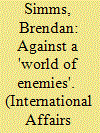

|
|
|
|
|
| Publication |
2014.
|
| Summary/Abstract |
Adolf Hitler's experiences during the First World War have been much discussed, with historians tending to concentrate on his involvement in the fighting and the operational lessons he later claimed to draw. Much less has been written about the impact of the war on his world view, though recent work has tended to suggest that his paranoid anti-Semitism was not yet visible during the conflict. Drawing on this latest research, but also on newly discovered sources and previously underused material, the author shows that Hitler's main preoccupation during the war and its immediate aftermath was the overwhelming power of Great Britain and its American ally. He associated these two powers with the alleged international Jewish economic conspiracy that had crushed the German empire. Hitler's anti-Semitism thus originated in an anti-capitalist, rather than anti-communist, discourse. He blamed Britain and the US for the rigours of the Versailles peace settlement, a moment which was far more politically formative for him than the experience of defeat itself. His encounter with American soldiers in the summer of 1918 also marked his first engagement with the global power of the United States and the start of a belief in the demographic weakness of the German empire which inspired his plans for Lebensraum in the east.
|
|
|
|
|
|
|
|
|
|
|
|
|
|
|
|
| 2 |
ID:
131430
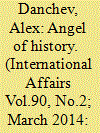

|
|
|
|
|
| Publication |
2014.
|
| Summary/Abstract |
This article explores the way in which art can illuminate war, in particular the Great War. It focuses on Paul Klee's painting, Angelus novus (1920), and the interpretation of that painting by Walter Benjamin, who owned it, in his celebrated theses 'On the concept of history' (1940). Benjamin's interpretation was a kind of parable: he called it the angel of history. Some have taken inspiration from that characterization; others have offered striking alternatives, including Kaiser Wilhelm II and even Adolf Hitler. The article traces the evolution of these identifications; it also considers the continuing artistic response, in historical perspective-notably Anselm Kiefer's The angel of history: poppy and memory (1989). It argues that our conception of the war, and of all wars, is profoundly affected by artistic imagination, and re-imagination.
|
|
|
|
|
|
|
|
|
|
|
|
|
|
|
|
| 3 |
ID:
131424
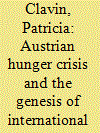

|
|
|
|
|
| Publication |
2014.
|
| Summary/Abstract |
From its foundation in 1918, the new Austrian republic was gripped by famine and a crisis of confidence in its currency that threatened to tip the new state into hyperinflation and revolution. This article shows how western efforts to aid Austria combat famine and its financial crisis were linked, and how they had a profound impact on the new League of Nations, the world's first multi-purpose intergovernmental organization. It also demonstrates the importance of the incipient wartime international bureaucracy for League agency. Contrary to the expectations of its architects, member governments, international financiers, businessmen and economists began to see the League as a useful tool to meet common needs that today would be called the search for human security. The article demonstrates how the Austrian food and financial crisis was the founding moment in the institutionalization of international economic and financial coordination, cooperation and oversight. It established the Economic and Financial Organization of the League of Nations, whose work would later inform its successors, the International Monetary Fund, the World Bank and the European Union. The study speaks to the ways in which the notion of security has broadened in the past two decades to embrace economic, social, political and environmental concerns. But the notion of 'human security' is not new; it was written into the body of the League.
|
|
|
|
|
|
|
|
|
|
|
|
|
|
|
|
| 4 |
ID:
131425
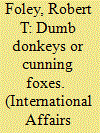

|
|
|
|
|
| Publication |
2014.
|
| Summary/Abstract |
The idea that the armies of the First World War were incapable of learning is one of the most enduring myths of the conflict. This image of 'lions led by donkeys' has proved difficult to modify, despite the sizeable scholarly literature on the tactical, technological and organizational adaptation and innovation undergone by all armies during the war. By examining the British and German armies as learning organizations during the war, this article contributes to the growing literature on wartime adaptation and innovation, as well as the wider literature on organizational learning in wartime. It demonstrates how the organizational cultures of these two armies shaped the way in which they learned, predisposing the British army towards radical, often technological, solutions to the tactical and operational challenges of the First World War battlefield, while inclining the German army towards incremental and tactical solutions to the same problems.
|
|
|
|
|
|
|
|
|
|
|
|
|
|
|
|
| 5 |
ID:
131423
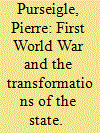

|
|
|
|
|
| Publication |
2014.
|
| Summary/Abstract |
Scholars of the First World War have long recognized the critical role played by the state in leading, organizing and managing the mobilization of belligerent societies, and the state's transformations have testified to the impact of industrialized warfare. Since the late 1980s, however, the cultural turn that largely accounts for the renewal and dynamism of First World War studies has shifted the emphasis away from the wartime state and its operations. Its study relatively suffered as a result. This article aims to bring the state back into the centre of the historiographical discussion, since its transformations testified to the nature and political impact of industrialized warfare. The article therefore focuses on three critical aspects of the relationship between state and society: the deployment of coercion, the expression of national solidarity and the redefinition of sovereignty. It demonstrates how the logic of mass participation in modern warfare transformed both the contours and the foundations of the state. To do so, the article draws on a renewed engagement with social scientific literature and the sociology of the state in particular.
|
|
|
|
|
|
|
|
|
|
|
|
|
|
|
|
| 6 |
ID:
131426
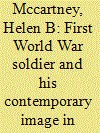

|
|
|
|
|
| Publication |
2014.
|
| Summary/Abstract |
The image of the First World War soldier as a cowed victim, caught in the grip of a meaningless, industrialized war, is one that has become entrenched in the British popular imagination. It was not, however, the image that dominated public discussion of the soldier between 1914 and 1918. This article seeks to examine how the portrayal of the soldier changed during and after the First World War and proposes that the victimized soldier motif has been reinforced today by the coalescence of three trends. The first is the growth of the family history industry that encourages an individualized and empathetic approach to the First World War. The second trend is concerned with an increasing public interest in psychological reactions to war. Since the Vietnam War, there has been a growing expectation that soldiers will be psychologically damaged by wartime experience. This has influenced the public perception of the First World War soldier, affecting, in particular, the discussion surrounding those executed for military crimes during the conflict. Finally, the article argues that long-term changes in British attitudes to the use of force, coupled with the experience of recent conflicts in Iraq and Afghanistan, have also coloured the way in which the First World War is portrayed. A range of interest groups have cast the contemporary British soldier as a victim in recent years and the article argues that the explicit linking of operations in Afghanistan and Iraq with the First World War has reinforced this victim image for each conflict.
|
|
|
|
|
|
|
|
|
|
|
|
|
|
|
|
| 7 |
ID:
131433
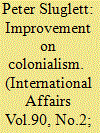

|
|
|
|
|
| Publication |
2014.
|
| Summary/Abstract |
The mandate system was created as part of the overall machinery of the League of Nations in an attempt to 'promote world peace' in the aftermath of the First World War. The 'A' mandates, with which this article is concerned, were the former Arab provinces of the Ottoman Empire that had been occupied and conquered by France and Britain by the end of the war. Was the mandate system in any sense an improvement on colonialism? To the extent that the period of foreign rule was rather short in comparison with other colonial regimes, one can perhaps say that it was. On the other hand, however high-minded its stated aims, the mandate system was a product of the imperial framework of its day, in which the white races were regarded as superior to the brown or black races. The supervisory instruments of the League (specifically the Permanent Mandates' Commission) were inadequate to deal with any shortcomings on the part of the mandatory, and there are a number of examples of situations where, for example, the legitimate interests of minorities were ignored to suit the wider interests of the powers. In general, the mandated states lacked institutional underpinning, and their immediate legacy was a string of weak states throughout the Arab world, where many of the institutions of civil society were destroyed in the course of military coups in the 1950s and 1960s.
|
|
|
|
|
|
|
|
|
|
|
|
|
|
|
|
| 8 |
ID:
131431
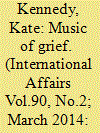

|
|
|
|
|
| Publication |
2014.
|
| Summary/Abstract |
The First World War involved composers just as it involved writers. We rarely hear, however, about the classical music that was written during the war, or after it, while for generations now the war has been remembered through the literature of the war poets and the memoirs of the late 1920s (Vera Brittain's Testament of youth, or Siegfried Sassoon's Memoirs of an infantry officer, for instance). This article aims to put composers alongside their literary counterparts, to present a fuller picture of cultural responses to the conflict. It looks at works by Edward Elgar, Ivor Gurney, Herbert Howells, Patrick Hadley, Gerald Finzi, John Foulds, Frank Bridge and in particular at Arthur Bliss's symphony on war, Morning heroes. It charts the changing responses of music to the war from the first patriotic statements to the requiems of the postwar years. It looks at compositions by civilians, and by composers who served abroad, to examine how classical music is uniquely placed to commemorate, inspire and mourn.
|
|
|
|
|
|
|
|
|
|
|
|
|
|
|
|
| 9 |
ID:
131434
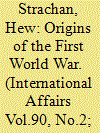

|
|
|
|
|
| Publication |
2014.
|
| Summary/Abstract |
The recent crop of books on the origins of the First World War dispenses with the notion of inevitability in the outbreak of war, and stresses the maturity of European civilization in 1914. They are in danger of prioritizing urban life over rural, civilization and culture over backwardness and superstition. They also say less than they might about the enduring place of war in international relations. The stress on contingency is to be welcomed for getting history away from the determinism of long-term trends, and for reopening the uncertainty of the outcomes still open to the Great Powers in 1914. However, the overall effect is cyclical. The prevailing wisdom on the reasons for war has reverted to the argument that 'Europe slithered over the brink', which dominated from the 1930s until the publications of Fritz Fischer in the 1960s. This does not mean that 'Fischerism', with its belief in German war guilt, is extinct. The challenge which now confronts historians, as they approach a four-year centenary, is to break this circularity and to explore new paths.
|
|
|
|
|
|
|
|
|
|
|
|
|
|
|
|
| 10 |
ID:
131429
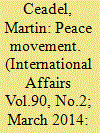

|
|
|
|
|
| Publication |
2014.
|
| Summary/Abstract |
The First World War led to the reconstruction and reinvigoration of the British peace movement, which steadily increased in activity and impact from 1914 until the end of the 1930s. This article defines the movement, explains why it emerged first and developed most influentially in Britain, and outlines the various phases of its history from the 1790s until the present day. It concentrates on the less well known phases of the movement's history: its origins during the French Revolutionary and Napoleonic Wars and on its moments of political significance during the nineteenth century. It says less about the post-1945 movement, which readers of International Affairs will be more familiar with, though it makes the point that 'peace' is currently being trumped as the primary political goal of most progressives by 'human rights', which can be invoked to justify military intervention.
|
|
|
|
|
|
|
|
|
|
|
|
|
|
|
|
| 11 |
ID:
131428
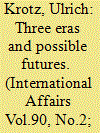

|
|
|
|
|
| Publication |
2014.
|
| Summary/Abstract |
This article offers a long-term perspective on the relations between France and Germany a century after the First World War. It probes three grand periods in Franco-German affairs: 'hereditary enmity' (1871-1945), 'reconciliation' (1945-63) and the 'special relationship' since 1963. Through an investigation of the basic meaning and patterns of interstate interaction, particularly the resilient and adaptable embedded bilateralism of recent decades, the article seeks not only to delineate the key elements of the past, but also to accentuate the stakes of the present, as well as to cast an eye towards the future. The significance of the current crises in European affairs, this article maintains, lies not in the first place in their momentary tumult or troubles, but rather in their potential to unravel constitutive aspects of Franco-German relations and European politics of the past half century. Today, next to a rejuvenated Franco-German bilateralism embedded in a wider Europe, two other trajectories appear as 'possible futures': German hegemony in a partially integrated Europe; and a Europe of chronic muddling through, presumably along with a degeneration of the European project.
|
|
|
|
|
|
|
|
|
|
|
|
|
|
|
|
| 12 |
ID:
131432
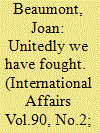

|
|
|
|
|
| Publication |
2014.
|
| Summary/Abstract |
This article examines what motivated the dominions to make such a sustained and costly contribution to the war effort of the British empire during the First World War. With particular reference to Australia, it argues that imperial loyalty, now discounted as anachronistic, was the dominant ideology. Not only did it inspire the initial generous support for the British war effort but, for many Australians, the empire's cause invested with meaning the battle losses which were proportionately the highest of any dominion army. The Gallipoli campaign of 1915 is now celebrated as having given birth to the foundational narrative of the young Australian nation, but at the time this embryonic nationalism too was positioned within the framework of imperial loyalty. Moreover, with the conservative forces dominating federal politics after the divisive debates about conscription in 1916 and 1917, 'loyalty' became entrenched as the litmus test of political reliability. Hence, while Australia's Prime Minister W. M. (Billy) Hughes aggressively asserted the rights of the dominions to a new and more independent role within the imperial relationship in 1918 and 1919, this agenda for change found little support at home. It is therefore ahistorical to see the First World War as the birth of Australian nationalism in the sense that the term is understood today. Rather, imperial loyalty was affirmed by the British victory as the dominant ideology and proved able to accommodate the growing sense of national singularity that the war fuelled.
|
|
|
|
|
|
|
|
|
|
|
|
|
|
|
|
|
|
|
|
|